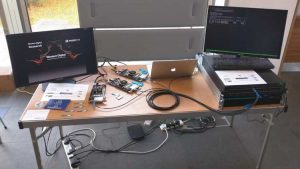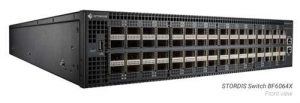Barefoot Networks With Partners Showcases In-Network Consensus for Use With Storage Class Memory and P4
Implementation developed by Western Digital and Università della Svizzera using Barefoots 6.5Tb/s Tofino switch ASIC
This is a Press Release edited by StorageNewsletter.com on October 3, 2018 at 2:47 pmAt the P4 European Workshop (P4EU 2018), Barefoot Networks and researchers from Western Digital Corp. and Università della Svizzera Italiana (USI), with support from Xilinx, Inc. and Stordis GmbH, have presented a breakthrough for providing in-network high-performance fault tolerance for Storage Class Memory (SCM) access using the P4 programming language.
The demonstration used a P4 program implementation developed by Western Digital and USI using Barefoot’s 6.5Tb/s Tofino switch ASIC.
In-network consensus for SCM
Programmable forwarding plane technology is enabling network owners to create and deliver value by accelerating application performance. One of the ways this is achieved is by offloading network functions that are run on servers or appliances onto switches. In addition to performing all standard switch and router functionality with higher efficiency and scale, P4-programmable forwarding planes enable Computational Networking use-cases that are not possible with fixed-function switching silicon, giving users the ability to create simple and scalable packet processing pipelines that meet their unique needs.
The richness of the open P4 ecosystem – with a high-performance, networking domain-specific processor, such as Tofino – empowers network owners, operators and application developers to create new functions and features at the forwarding plane-level to extract more value out of the network.
“The usage of new, emerging memories, such as persistent memory, offer huge possibilities to address the increasing diversity of big data and Fast Data applications and workloads proliferating in our data-centric world,” said Dejan Vucinic, director, R&D engineering, non-volatile memory systems architecture group, Western Digital. “However, they require purpose-built system architectures to take full advantage of their speeds in the fae of their finite endurance. This breakthrough illustrates new potential for independent scaling of compute and main memory well beyond the practical limits of today’s prevailing architectures.“
“While most people think of Tofino and P4 as being for networking, this project shows an exciting use-case for storage systems,” said Robert Soulé, professor, Faculty of Informatics at Università della Svizzera Italiana, and research scientist, Barefoot. “For 20 years, researchers have been trying to improve the performance of consensus protocols. We have been able to achieve five orders of magnitude improvements in throughput by moving these computations into the network. It opens up a whole new way to think about distributed storage.“
“Once again the versatility of Barefoot Tofino and P4 is demonstrated in their ability realize unique functions in the network, this time for distributed storage applications,” said Alexander Jeffries, CEO, Stordis. “Our expertise in open source networking is helping our Tofino-based switches to be the platforms of choice for delivering innovation in networking by both the industry and academia.“
“When you create technology that is truly open and end-user programmable without compromise on performance and price, the possibilities are boundless,” said Prem Jonnalagadda, director, product management, Barefoot. “The ability to run consensus protocols directly in the switch forwarding plane using P4 and Tofino creates significant benefits to the shared storage environments, delivering the best end-to-end system and application performance.“
In a testament to the agility of P4-programmable forwarding planes, the live demonstration shows the use of a Tofino-powered switch running a variation of a classic consensus protocol by Attiya, Bar-Noy, and Dolev (ABD), adapted for use with SCM. The project allows users to keep replicated copies of remote, non-volatile memory consistent, while also ensuring low latency access times. This is an important step towards replacing the traditional memory hierarchy with a cost-effective, uniform type of memory/storage that is resistant to failures.
The demo runs on the Stordis BF6064X, a 64-port 100GB bare-metal switch powered by a 6.5Tb/s capacity Tofino ASIC. To simulate the memory endpoints, the demo uses Xilinx NetFPGA-SUME development boards.
The project team consisted of Vucinic, Marjan Radi, and Yang Liu from Western Digital, and Prof. Soulé, Prof. Fernando Pedone, and Huynh Tu Dang, Systems Institute, USI, and Jaco Hofmann, Technische Universität Darmstadt. They presented the paper at P4EU 2018 on September 24: 1st P4 European Workshop (P4EU 2018).
Resources:
Details on project: New Breakthrough Main Memory Scale-out
Full paper: Consensus for Non-Volatile Main Memory.
P4EU 2018 is the first P4 Language Consortium event in Europe. It aims to bring together P4 and P4->NetFPGA researchers from Europe and around the world to foster the growth of the P4 Community. P4EU, which will run as a workshop held in conjunction with the 26th IEEE International Conference on Network Protocols (ICNP), aims to enable researchers to publish early stage work and small scale projects.
Video: Feature one of its customers Kaloom discussing their experience with Barefoot Tofino and P4 Studio.
Barefoot Networks will be onsite at ONS Europe 2018, September 25-27, showcasing P4 applications such as Segment Routing v6 for Mobility use-case, developed using Barefoot P4 Studio. Session catalog
About Barefoot Networks
The company launched in 2016 after two years of developing technology that built switch silicon with a forwarding plane that is defined in software while not compromising on performance. It empowers network owners and their infrastructure partners to design, optimize, and innovate to meet their specific requirements and gain competitive advantage. In combining the P4 programming language with fast programmable switches, The firm has also created an ecosystem for compilers, tools, and P4 programs to make P4 accessible to anybody. Backed by Google Inc., Goldman Sachs Principal Strategic Investments, Alibaba, Tencent, and by premier venture capital firms Sequoia Capital, Lightspeed Venture Partners, and Andreessen Horowitz, Barefoot Networks is headquartered in Silicon Valley.















 Subscribe to our free daily newsletter
Subscribe to our free daily newsletter

